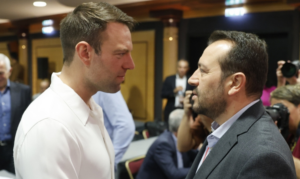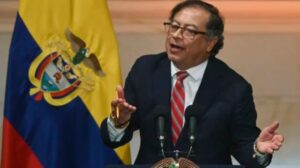Trench warfare lasted until the early hours of today in SYRIZA – Progressive Alliance, as the six-hour meeting of the Parliamentary Group was not enough to defuse internal tensions but instead deepened the rift between the party leader, Stefanos Kasselakis, and key former internal supporters.
Apart from Pavlos Polakis, who stated that he is on the verge of making ‘major decisions,’ as he commented on social media early this morning amid the backdrop of a split in SYRIZA’s Parliamentary Group, Sokratis Famellos, until recently the leader of the Parliamentary Group, was added to the significant losses for Stefanos Kasselakis yesterday.
From surprise to entrapment
The need for changes in the functioning of SYRIZA PS’s parliamentary group under the party leadership was the reason behind the dismissal of Mr. Famellos from the position of head of the official opposition in Parliament. Clearly displeased by the announcement of his replacement by Mr. Kasselakis, Sokratis Famellos was the one who surprised Mr. Kasselakis at the end of yesterday when, upon hearing of Nikos Pappas’s appointment as the new President of the Parliamentary Group, Mr. Famellos declared, ‘I will not resign.’ However, despite Mr. Kasselakis’s attempt to impose his agenda and his influence within the party, Mr. Famellos was not caught off guard by his replacement and was reportedly determined to react to Mr. Kasselakis’s decision, which he did, taking a leadership stance.
As he explained in a post in the early hours, ‘The proposal to change the presidency, instead of correcting past mistakes and addressing the real problems we have, makes things much worse,’ concluding that ‘real problems cannot be covered up by surprises and dismissals. Nor can we solve problems by creating internal enemies.’ This was especially the case since Sokratis Famellos had significantly contributed to giving Stefanos Kasselakis valuable time in the leadership of SYRIZA PS when, at the Congress last February, with a consensus proposal along with Giorgos Tsipras and Nikos Pappas, they averted a confrontation between the current President and Olga Gerovasili.
At the same time, the fact that Sokratis Famellos was warmly applauded by thousands of delegates at the February Congress did not go unnoticed by Koumoundourou, nor that his presence at the helm of SYRIZA PS’s Parliamentary Group was widely accepted by the overwhelming majority of MPs and society. As a result, Mr. Famellos was not invited to all party bodies recently, such as the Executive Office, and felt the presence of Stefanos Kasselakis on social media during critical parliamentary debates when he was at the podium articulating positions on behalf of SYRIZA PS.
Even though Koumoundourou did not look favorably on Mr. Famellos’s leadership presence at the top of the Parliamentary Group, he had not given any reason to be questioned or sidelined by the current President. Following yesterday’s developments, however, even neutral party observers pointed out that the former leader of the Parliamentary Group of SYRIZA PS and former internal ally of Stefanos Kasselakis has laid the groundwork, if not set course, for the leadership of SYRIZA PS, should the succession process open with a motion of no confidence.
It is no secret, after all, that Sokratis Famellos was being approached since last summer as a potential successor to Alexis Tsipras. After his appearance at yesterday’s meeting of the SYRIZA PS Parliamentary Group, he could rally those who voted against the President’s proposal and have significantly strengthened their forces.
The “87” gain strength
Specifically, the ‘Movement of 87,’ which initially comprised of seven MPs, saw its parliamentary forces reach 12 yesterday, with four additional MPs declaring present, and Alexis Tsipras was absent. Given that Popi Tsapanidou did not vote as she has not yet been sworn in as an MP, circles of the ‘87’ conveyed in the early hours that ‘Kasselakis is a president without a majority in the Parliamentary Group,’ having 17 out of 35 MPs, as they noted.
Responding to the ‘87,’ sources from Koumoundourou countered that ‘The President has a vast majority at the grassroots. Only this majority counts,’ concluding that ‘if the group of 87—or whoever they are—wishes, let them challenge him at the Central Committee.’ However, this remark gave the impression of acknowledging the dynamics described by the ‘87,’ opening, for the first time, the possibility of a return to the polls from Koumoundourou’s side, given that its leadership had conveyed all these days that they do not wish to ‘trouble’ the SYRIZA PS supporters with new elections.
Ask me anything
Explore related questions





